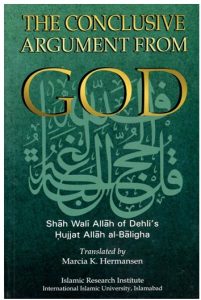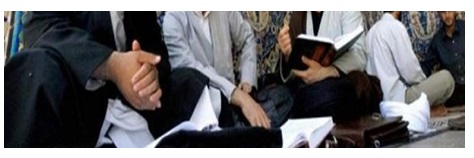Shah Wali Allah on Taqlid
On following the four well-established schools of Islamic jurisprudence, Shah Wali Allah has clearly articulated that the Ummah has agreed on the permissibility of absolute imitation (Taqlid) of them up until our time. According to him, ‘in these are benefits which are not concealed—especially in these days in which people’s endeavors fall very short, their hearts have become of self-seeking and everyone delights in his own opinion,’ writes NOOR MOHAMMED KHALID.
 In Book 7 of his Hujjatullah al-Baligha, Shah Wali Allah, the 17th century reformer of Islam from the Indian subcontinent, traces the historical developments in Islamic learning from the earliest centuries up to the era during which disputes between different scholars arose, and the situation as it prevailed during his own lifetime.
In Book 7 of his Hujjatullah al-Baligha, Shah Wali Allah, the 17th century reformer of Islam from the Indian subcontinent, traces the historical developments in Islamic learning from the earliest centuries up to the era during which disputes between different scholars arose, and the situation as it prevailed during his own lifetime.
In Shah Wali Allah’s understanding, the disputes among scholars began to grow in the fourth century of the Hijra due to the passing away of learned men who were very well-versed in the sciences of Hadith and Fiqh and were people of ability.
After this era, the Islamic world witnessed a dwindling of capable scholars, which led to people adhering to one school of thought or the other.
Even though, asserts Shah Wali Allah, there did exist, in the early generations, people who did Taqlid of specific scholars, their adherence to these scholars was not unqualified and absolute.
In the fourth century, observes Shah Wali Allah, the people “were not agreed on the absolute imitation (Taqlid) of the school of a single person and relying only on his opinion….” Rather, he avers:
“In cases involving consensual issues about which there was no disagreement among the Muslims and among the majority of the Mujtahids, the common people only performed taqlid of the master of legislation (the Prophet).
“They used to learn the manner of ablution, full bath, prayer, zakat and so on from their forefathers or the teachers of their cities—and they acted according to this. If some uncommon situation arose, they would ask for a legal opinion about it from whichever mufti they found without specifying a legal school.”
He goes on to write, quoting Imam Ghazali, that in later generations “people abandoned theology and the disciplines of knowledge of the religious sources (‘ilm) and became interested instead in contentious issues.”
The Shah adds, “Among them are that people came to depend on Taqlid, and this Taqlid slowly crept into their hearts while they remained unaware of it.”
Explaining how this situation came to be, he notes:
“One reason for this was competition among the jurists and their disputing among themselves, so that when competition in giving legal opinions occurred among them, whoever gave a fatwa about something was contradicted about that fatwa. He then replied to this so that the discussion was not brought to a conclusion except through recourse to the pronouncement of someone who had given averdict on the issue in an earlier era.”
“An additional reason for Taqlid was the injustice of the judges, for once most of the judges had become unjust and were no longer reliable, only that on which the common people did not cast doubt was accepted from them, i.e., something which had been ruled on previously.”
Shah Wali Allah also mentions other intractable differences that were found among the so-called learned people of these later generations. He describes the detrimental nature of these disputes in the following words:
“The harmfulness of this disputation, disagreement, and hair-splitting was close to that of the first crisis (of the Muslim community) when people quarrelled over rulership and took up sides. Just as the former resulted in a tyrannical rulership and events of severity and folly—similarly these latter (disputes) led to ignorance, interpolations, doubts, and conjecture from which there is no hope of deliverance. Subsequent to them, generations arose who relied purely on Taqlid, neither distinguishing the true from the false nor the argument from the inference (Istinbat).”
Note the choice of words in which Shah Wali Allah expresses his deep anguish about those who caused schism among the Muslims in the later centuries:
“The faqih of this time was a prattler and wind-bag who indiscriminately memorized the opinions of the jurists whether these opinions were strong or weak, and related them in a loud-mouthed harangue; and the hadith scholar (muhaddith) became a person who counted up the hadiths whether sound, faulty, or nonsensical, and recited them quickly like an entertainer, flapping his jaw full-force.”
However, the Shah qualifies the above indictment in these words:
“I don’t say that this is so in all cases, for God has a group of His worshippers unharmed by their failure, who are God’s proof on His earth even if they have become few.”
Yet, he moans that,
“No time has come after that except that the crisis has increased and Taqlid has become more prevalent, and integrity has become  more and more absent from people’s hearts, until they have become content to leave off examining religious matters and so that they say, ‘We found our fathers following a community and we follow in their footsteps.’”
more and more absent from people’s hearts, until they have become content to leave off examining religious matters and so that they say, ‘We found our fathers following a community and we follow in their footsteps.’”
Interestingly, Shah Wali Allah quotes in detail the stand of Ibn Hazm who was vehemently opposed to Taqlid, which may lead to one believing that he, unequivocally, sides with the Andalusian scholar in this matter. But, in the following paragraph, the Shah provides his own opinion in this matter as follows:
“(Ibn Hazm’s saying applies to) the person who is not learned and follows a particular one of the jurists believing that no one like him could err and that what he said must definitely be correct, and who has secreted in his heart not to leave off following him even if a proof opposing him would come to light.”
He adds:
“This statement (of lbn Hazm) does not apply to the one who obeys only the sayings of the Prophet, may the peace and blessings of God be upon him, and only considers permitted what Allah (swt) and his Prophet made permissible, and only considers forbidden what God and his prophet have forbidden.
“However if he doesn’t have information about what the Prophet, may the peace and blessings of God be upon him, said, neither by way of correlating conflicting statements about what he said, nor by means of deduction from his saying, he may follow a rightly-guided learned person provided that he is correct in what he says, and that he gives a clear legal opinion clearly based on the Sunnah of the Prophet, may the peace and blessings of God be upon him….”
In support of his stand that preference must be given to a sound hadith over mere rulings issuing from jurists, he directly quotes the leading Imams in support.
“In the case when I have held something or established it as a principle, if there should later come to your attention some saying of the Prophet, may the peace and blessings of God be upon him, conflicting with what I said, then what he, may the peace and blessings of God be upon him, said, must be upheld.” (Imam Shafi’i)
Abu Hanifa, may God be pleased with him, used to say, “One who does not know my indicating factor (dalil) must not give a fatwa based on my opinion,” and he, may God be pleased with him, whenever he gave a fatwa, used to say:
“Al-Nu’man ibn Thabit, i.e., his own name, has this view and this is the best we were able to do, so if someone comes up with something better, this is more correct.”
Imam Malik, may God be pleased with him, used to say,
“Anyone’s opinion may either be accepted or rejected except that of the Prophet of God, may the peace and blessings of God be upon him.”
Al-Hakim and al-Baihaqqi reported that al-Shafi’i used to say, “If there is a sound hadith, that becomes my opinion,” and in another report, “If you see that my opinion opposes this hadith, then act according to the hadith, and throw my opinion out of the window.”
The above notwithstanding, the Shah is cognizant of the common people and their lack of recourse to Islamic knowledge. Thus, he says, “the school of the common person is the fatwa of his mufti.”
Commenting on Shah Wali Allah’s exposition of the disputes that arose among the scholar and the common people from the fourth century onwards, and his allusion to blind taqlid as being responsible for much of the internecine quarrels, Maulana Mufti Saeed Ahmed Palanpuri, in volume two of his five-volume commentary on Hujjatullah al-Baligha, states,
“In his statements, Shah Saheb is not inviting people to give up Taqlid…Rather, the objective is that Taqlid be done with proper and clear understanding, and not blindly. Shah Wali Allah contends that the Quran and Hadith must not be considered just a source of blessings, but these should be given an important role in one’s life. Allah be thanked! It is through the efforts (barakah) of Shah Saheb, his progeny and his students that the stagnation (in Islamic sciences) was broken; and the process of learning and understanding of the Quran and Hadithwas revived.
“The Darul Uloom Deoband and similar organizations made the study of these disciplines widespread. Still, there is another spark that needs to be ignited, since, unfortunately, even at the level of the graduates of these madaris, they have not been made to understand that the Qur’an and Hadith are to be comprehended directly. The madaris consider it sufficient if the students just read them; whereas this is not sufficient: persevering with them throughout one’s lifetime is essential.”
On following the four well-established schools, Shah Wali Allah has clearly articulated that the Ummah has agreed on “the permissibility of performing Taqlid of them up until our time. In these are benefits which are not concealed—especially in these days in which people’s endeavors fall very short, their hearts have become of self-seeking and everyone delights in his own opinion.”

